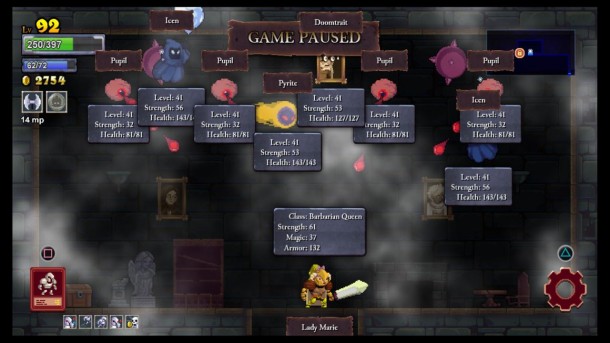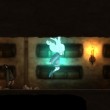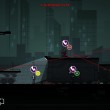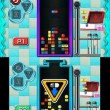Rogue Legacy Review
What will your children inherit when you die? Your house? Your debts? Your sweet record collection? The PlayStation port of Rogue Legacy has inherited its PC parent's engaging exploration and combat, mixing some of the best elements from games like Spelunky and Castlevania: Symphony of the Night to create a fusion that makes each individual play session feel distinct while also giving you a satisfying sense of progression. It may not have gained much in the transition, but Rogue Legacy is still as great as it always was.
Rogue Legacy drops you into a randomized castle that's very reminiscent of Symphony of the Night, not only in its map and exploration style, but also in combat basics, in the feel of the movement, and even in its many enemy types. You jump and slash your way through a 2D map with a sword and a variety of secondary weapons (including an ax that's thrown in an arc), fighting the likes of skeletons, flying skulls and sword-wielding heavies in bulky armor. Obtaining the ability to double jump or dash unlocks further exploration options, allowing you to find better chests that yield better loot. Rogue Legacy is far from a cheap Castlevania knockoff, but the inspiration is clear.
One of the main differences between the two games is that death is permanent in Rogue Legacy. When you die, you're done, and you must start a new adventure at the beginning of the castle next time around, though certain aspects remain constant. (For example, the forest is always on the right side of the map.) You don't collect much in the way of items or weapons, but when you die, those are gone too.
When other games in this vein talk about permanent death, they really mean it. You start over from square one, and you carry absolutely nothing with you. But in Rogue Legacy that's not entirely true. Any items you collected or enemies you killed are lost, yes, and the castle will be different the next time you enter it. But all the gold you collected stays with you, passed down to your child as an inheritance. You can spend that gold on equipment, buffs or permanent stat upgrades that persist with each run through the castle. So while you're not playing as the same character throughout the game, you're still getting stronger every time you play. Admittedly this can make the early parts of the game somewhat tedious, as you probably won't be powerful enough for certain enemies no matter how skilled you are at dodging attacks. On the flip side, that same grind provides a way for less skilled players to eventually brute force their way through even the toughest bosses.
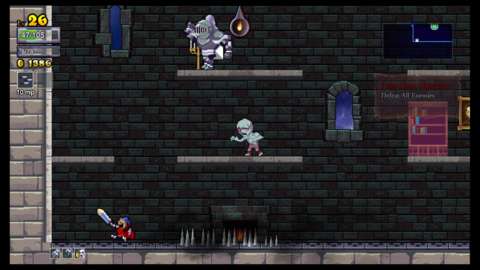
It's this careful balance, this mix between steady progression and permanent death, that makes Rogue Legacy so enthralling. Each run feels important, because you will only see the end of the game if you can take out that next boss that you're struggling with, and you just know that this is the run, this is the time that it will all come together and you'll come out the other side alive. You've memorized the attack pattern and perfected your jump timing, so that boss is going down. But if you fail? If you fall to the castle's creatures before even reaching the boss? It wasn't all for nothing. A little piece of that character's legacy will live on, and you will carry better stats with you next time because of it.
But even though your base stats will carry on, each child--each new character you send into the castle--is still different, at least to a point. Every time you start the game, you are presented with three random descendents to choose from, and they vary in class and traits. Classes are your typical role-playing fare, with options like the barbarian, a class with a large amount of health, or the assassin, who is low on health but has a higher chance of critical hits. Traits are a little different, as they're random attributes that could have wildly different effects--or no effect at all--on how that character operates. Many traits are clever even when they make gameplay more of a chore, such as having a hero that is colorblind (thus making the game black and white) or a heroine who is a hypochondriac, which makes the damage numbers spilling from your character exceptionally larger than their actual value. Other traits are more pointless and even sophomoric, such as the I.B.S. trait that makes you fart randomly. Still, these neat elements of randomness help mix up the individual playthroughs.
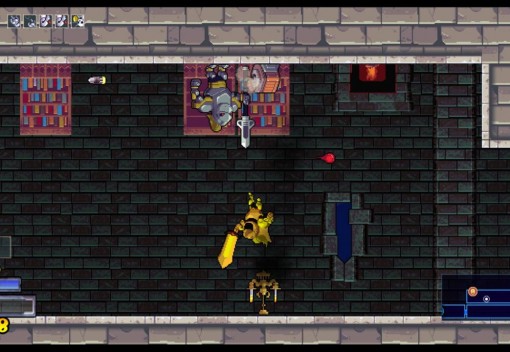
All three PlayStation versions of the game (PS3, PS4 and Vita) are virtually identical, with the Vita version only missing out on one ultimately pointless feature, a trait that induces "random muscle spasms" and makes your controller vibrate. All three are wonderful versions of the game, though the text on the Vita version can be blurry and hard to read at times. They also contain extra content that was added to the PC version after its initial release, including new traits, new rooms, and, most noticeably, remixed versions of the game's bosses that provide a good challenge to anybody who seeks them out. Rogue Legacy supports Sony's cross buy and cross save features, letting you pick up your saved PS4 game on your Vita with relative ease.
It's almost unfair to compare Rogue Legacy to other games that emphasize permanent death. It doesn't have the secrets of Spelunky and it's more predictable than The Binding of Isaac, yet at the end of every game comes a desire to hop right back in, spend your gold on some upgrades and rack up more monster kills, something the game encourages with a challenging new-game-plus option that appears after the credits roll. Whether you play it on your home console or on the go, it's worth exploring Rogue Legacy's castle again and again and again.

